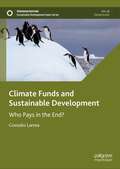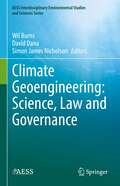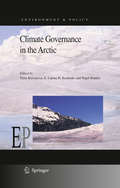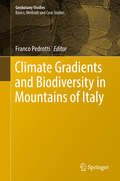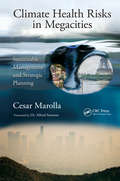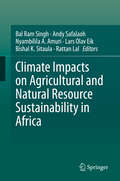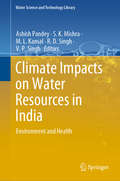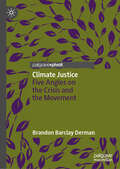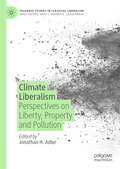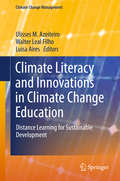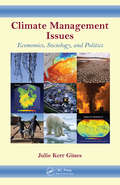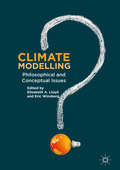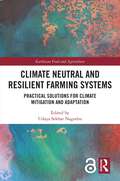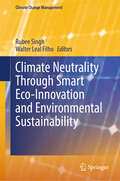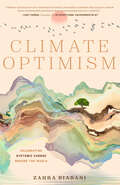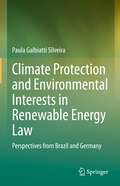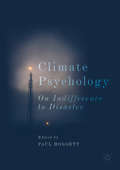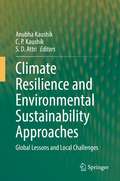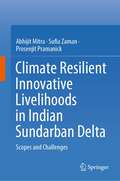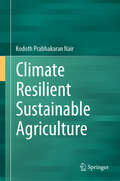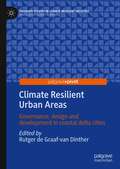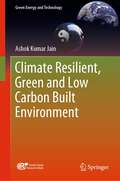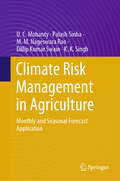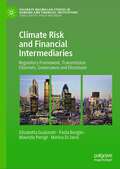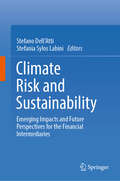- Table View
- List View
Climate Funds and Sustainable Development: Who Pays in the End? (Sustainable Development Goals Series)
by Gonzalo LarreaWhile significant attention has been devoted to achieving Sustainable Development Goal 13 (SDG 13) and scaling up climate finance for developing countries, the adverse impacts of funded projects on local communities remains inadequately explored by both academics and policymakers. Mobilizing climate finance on an unprecedented scale is undeniably vital for the success of developing countries’ climate policies. However, these initiatives often give rise to adverse consequences for individuals in these countries, leading to displacements, exacerbating food insecurity, or even triggering conflicts over resources.This book examines the extent to which the climate funds established for achieving SDG 13 are adequate for addressing climate change impacts in developing countries. Yet, its analysis transcends the mere evaluation of the sufficiency or efficacy of these efforts found in much of the existing literature. Beyond the scope of quantifiable success, the book delves into the root causes of the adverse impacts that these funds can have on local communities and offers tailored recommendations to realize the noble aspirations of SDG 13, all without implying that the individuals who should benefit from climate finance are the ones who pay in the end.
Climate Geoengineering: Science, Law and Governance (AESS Interdisciplinary Environmental Studies and Sciences Series)
by Wil Burns David Dana Simon James NicholsonThe sobering reality of the disconnect between the resolve of the world community to effectively address climate change, and what actually needs to be done, has led to increasing impetus for consideration of a suite of approaches collectively known as “climate geoengineering,” or “climate engineering.” Indeed, the feckless response of the world community to climate change has transformed climate geoengineering from a fringe concept to a potentially mainstream policy option within the past decade. This volume will explore scientific, political and legal issues associated with the emerging field of climate geoengineering. The volume encompasses perspectives on both of the major categories of climate geoengineering approaches, carbon dioxide removal and solar radiation management.
Climate Governance in the Arctic (Environment & Policy #50)
by E. Carina Keskitalo Nigel Bankes Timo KoivurovaClimate change is affecting the Arctic environment and ecosystems at an accelerating speed, twice the rate of the global average. This is opening the Arctic to transportation and resource development and creating serious challenges for local communities and indigenous peoples. Climate Governance in the Arctic considers two aspects of climate change from an institutional perspective. It focuses on how relevant regimes, institutions and governance systems support mitigation of climate change. It also examines the extent to which the varying governance arrangements in the Arctic support adaptation and the development of adaptation processes for the region. The book's focus on Arctic governance offers unique insights within climate change mitigation and adaptation research.
Climate Gradients and Biodiversity in Mountains of Italy (Geobotany Studies)
by Franco PedrottiThis volume gathers case studies on plant diversity from selected, representative mountain systems of Italy (Mediterranean and temperate zones), while also addressing the biodiversity of avian fauna. For the Alps, Wilhalm and Prosser examine the species biodiversity (also with the help of highly detailed location maps) of the sector of the central Alps that corresponds to the basin of the Adige, including some nearby valleys, between the watershed to the north and the Prealps to the south (Alto Adige and Trentino). In turn, Pedrotti investigates the vegetation series of the same territory in relation to the three climatic sectors identified: prealpine, alpine and endoalpine. Aleffi then explores the relationships between the distribution of a number of species of bryophytes and the main mesoclimatic gradients along a transect through the Valle dell' Adige between 46#65533;40'N and 45#65533;42'N. Lastly, Siniscalco studies the ways in which alien species are now invading the western Alps, which to date have remained largely unaffected by this phenomenon, unlike the plains and hills. For the Apennines, Ferrari studies the tree line and the biodiversity of the vegetation of the northern Apennines; for the mountains of Sicily, Bazan conducts a diachronic analysis of the beech forests of the Monti Nebrodi. The contribution by Venanzoni interprets the chorology of associations of the Magnocaricetalia order throughout Italy, relating it to the climatic and geographic gradients. He describes a total of 55 associations, reporting on the distribution in the temperate zone (differentiating between the alpine and continental) and the Mediterranean zone for each of them. Cianfaglione presents the Signal Project Italian site. This project investigates the effects of extreme weather events on secondary grassland and the role of selected alien species, mowing, biodiversity, productivity and functional traits, in Italy and along a European gradient. For the Marches Region, Forconi describes the biodiversity of the avian fauna in relation to the altitudinal gradient and the potential vegetation.
Climate Health Risks in Megacities: Sustainable Management and Strategic Planning
by Cesar MarollaClimate Health Risks in Megacities: Sustainable Management and Strategic Planning courageously confronts the immense challenges of alleviating climate change and takes the initiative to layout an agenda that calls for action in the rapidly changing landscape of our global climate. This guide provides a constructive methodology for developing and implementing risk management and operational continuity management systems to climate change effects on urban populations. It addresses key issues such as physical location, proper sanitation, food security and vector-borne diseases against the backdrop of climate change, and then model its effect on the urban dwellers. The author also reveals the benefits of implementing a unique risk management approach to combat global threats and focuses on building urban resilience in the face of disasters. Prepared with a comprehensive and forward-thinking style, this book draws on indispensable case studies in key megacities like New York, Los Angeles, Beijing, Rio de Janeiro, London, Mumbai, and Lagos, and links researchers, scientists, city’s mayors, environmentalists, policy-makers and world leaders from central areas to review, reflect, and expound on future directions.
Climate Impacts on Agricultural and Natural Resource Sustainability in Africa
by Rattan Lal Bal Ram Singh Lars Olav Eik Andy Safalaoh Nyambilila A. Amuri Bishal K. SitaulaThis book discusses knowledge-based sustainable agro-ecological and natural resource management systems and best practices for sustained agricultural productivity and ecosystem resilience for better livelihoods under a changing climate. With a focus on agriculture in Africa, the book assesses innovative technologies for use on smallholder farms, and addresses some of the key Sustainable Development Goals to guide innovative responses and enhanced adaptation methods for coping with climate change.Contributions are based on 'Capacity Building for Managing Climate Change in Malawi' (CABMACC), a five-year program with an overall goal to improve livelihoods and food security through innovative responses and enhanced capacity of adaptation to climate change. Readers will discover more about sustainable crop production, climate smart agriculture, on-farm energy supply from biogas and the potential of soil carbon sequestration in crop-livestock systems.
Climate Impacts on Water Resources in India: Environment and Health (Water Science and Technology Library #95)
by V. P. Singh Ashish Pandey S. K. Mishra M. L. Kansal R. D. SinghThis book chiefly focuses on environmental flow, water pollution and water quality. Several chapters also cover water treatment technologies and management. In today’s context, climate change and climate variability are important issues in the water sector, which is called upon to develop adaptation strategies to cope with their negative impacts. Human health depends upon the quality of water used for drinking and irrigation purposes. These core issues are discussed and addressed in several chapters. The book explores the impact of climate change on water resources and considers various climatological scenarios. In this regard, it carries out a trend analysis and compares the performance of various Global Climate Models (GCMs). Further, it conducts a water quality analysis and water quality mapping so as to provide information on the most vulnerable areas in the context of water quality. Emerging pollutants, generated from paper mills, are identified in order to choose an appropriate treatment technology. Bioremediation techniques are included for the characterization of improved water quality parameters. The book also presents a low-cost treatment technology for fluoride removal, which can help water managers ensure potable water to stakeholders. In terms of maintaining river ecology in the downstream areas of water resources project sites, the book provides a number of case studies on assessment of environmental flows. Advanced treatment technologies that can be highly advantageous for removing water pollutants are presented. Given its scope, the book offers a valuable resource for academics, water resources practitioners, scientists, water managers, environmentalists, administrators, NGOs, researchers and students who are involved in water management with a main focus on water pollution, the environment, climate change and health.
Climate Justice: Five Angles on the Crisis and the Movement
by Brandon Barclay Derman“Because the development of the carbon economy has always been closely bound up with the deepening of human inequalities, movements seeking climate justice need to unravel a tangle of social injustices at all scales. Through viewing the climate crisis from a range of historical and contemporary angles, Derman elevates the leadership of the most marginalized communities and nations, and interweaves their particular experiences with the universal values that bound climate justice movements together. His work is an effective introduction for educators and students to the complexities and promises of climate justice studies.” -Zoltán Grossman, Faculty in Geography and Native American & Indigenous Studies, The Evergreen State College "Guided by a five-angle framework that aims to explore the emerging intersectionalities of space, time, difference, rule, and movement in climate justice theory and action, the book brings to light new possibilities and ways of imaging, doing, and transforming climate justice in a time of planetary urgency." -Peter Little, author of Critical Zones of Technopower and Global Political Ecology This book provides an analytical introduction to the complex challenge of climate change and the equally multi-faceted movement for climate justice. Its approach is empirically and conceptually rich, while remaining both accessible and engaging. Each chapter examines the topic through a different thematic lens, drawing on contemporary and landmark scholarship, advocacy, and activism across relevant disciplines and campaigns. These distinct angles build toward a comprehensive perspective that will equip readers to ably and critically engage in era-defining policy, political, governance, and scholarly debates.
Climate Liberalism: Perspectives on Liberty, Property and Pollution (Palgrave Studies in Classical Liberalism)
by Jonathan H. AdlerClimate Liberalism examines the potential and limitations of classical-liberal approaches to pollution control and climate change. Some successful environmental strategies, such as the use of catch-shares for fisheries, instream water rights, and tradable emission permits, draw heavily upon the classical liberal intellectual tradition and its emphasis on property rights and competitive markets. This intellectual tradition has been less helpful, to date, in the development or design of climate change policies. Climate Liberalism aims to help fill the gap in the academic literature examining the extent to which classical-liberal principles, including an emphasis on property rights, decentralized authority and dynamic markets, can inform the debate over climate-change policies. The contributors in this book approach the topic from a range of perspectives and represent multiple academic disciplines. Chapters consider the role of property rights and common-law legal systems in controlling pollution, the extent to which competitive markets backed by legal rules encourage risk minimization and adaptation, and how to identify the sorts of policy interventions that may help address climate change in ways that are consistent with liberal values.
Climate Literacy and Innovations in Climate Change Education: Distance Learning for Sustainable Development (Climate Change Management)
by Walter Leal Filho Ulisses M. Azeiteiro Luísa AiresThis book addresses the links between climate change and the threats it poses to sustainable development, from a distance education perspective. Discussing current trends and challenges in sustainable development education, climate literacy and innovations in climate change education, it contributes to the global debate on the implementation of education for sustainability. It also assesses the role that e-learning can play in this process, addressing pedagogical concepts as well as the wide range of technological options now available.
Climate Management Issues: Economics, Sociology, and Politics
by Julie K. GinesDespite all the controversy and hype that climate change has generated, there now exists an overwhelming body of scientific evidence that the problem is real and that its effects are already being felt on a global scale. Part of what makes this a volatile and controversial issue is that it is not just confined to the realms of the scientific commun
Climate Modelling
by Elisabeth A. Lloyd Eric WinsbergThis edited collection of works by leading climate scientists and philosophers introduces readers to issues in the foundations, evaluation, confirmation, and application of climate models. It engages with important topics directly affecting public policy, including the role of doubt, the use of satellite data, and the robustness of models. Climate Modelling provides an early and significant contribution to the burgeoning Philosophy of Climate Science field that will help to shape our understanding of these topics in both philosophy and the wider scientific context. It offers insight into the reasons we should believe what climate models say about the world but addresses the issues that inform how reliable and well-confirmed these models are. This book will be of interest to students of climate science, philosophy of science, and of particular relevance to policy makers who depend on the models that forecast future states of the climate and ocean in order to make public policy decisions.
Climate Neutral and Resilient Farming Systems: Practical Solutions for Climate Mitigation and Adaptation (Earthscan Food and Agriculture)
by Udaya Sekhar NagothuThis book presents evidence-based research on climate-neutral and resilient farming systems and further to provide innovative and practical solutions for reducing greenhouse gas emissions and mitigating the impact of climate change. Intensive farming systems are a significant source of greenhouse gas emissions, thereby contributing to global warming and the acceleration of climate change. As paddy rice farming is one of the largest contributors, and most environmentally damaging farming systems, this will be a particular focus of the book. The mitigation of greenhouse gas emissions needs to be urgently addressed to achieve the 2 degrees Celsius target adopted by COP21 and the 2015 Paris Agreement, but this is not possible if local and national level innovations are not accompanied by international level cooperation, mutual learning and sharing of knowledge and technologies. This book, therefore, brings together international collaborative research on climate-neutral and resilient farming systems compiled by leading scientists and experts from Europe, Asia and Africa. The chapters present evidence-based research and innovative solutions that can be applied or upscaled in different farming systems and regions across the world. Chapters present models and technologies that can be used for practical implementation at the systemic level and advance state of the art knowledge on carbon neutral farming. Combining theory and practice, this interdisciplinary book provides guidance which can inform and increase cooperation between researchers from various countries on climate-neutral and resilient farming systems. Most importantly, the volume provides recommendations which can be put into practice by those working in the agricultural industry, especially in developing countries, where they are attempting to promote climate-neutral and resilient farming systems. The book will be of great interest to students and academics of sustainable agriculture, food security, climate mitigation and sustainable development, in addition to policymakers and practitioners working in these areas.
Climate Neutrality Through Smart Eco-Innovation and Environmental Sustainability (Climate Change Management)
by Walter Leal Filho Rubee SinghThis book discusses how the relationship between climate neutrality, smart eco-innovation, and environmental sustainability can be understood as well as possible with an emphasis on relevant matters and challenges of a sustainable environment. It describes a framework for implementing climate resilient sustainable development, adaptation, and mitigation actions to achieve climate neutrality and the development of smart eco-innovations from the perspective of social, economic, and environmental aspects. The issue of climate neutrality is a critical one, and there are serious concerns about it. It is of great importance to understand the mechanism of climate change movement and climate variability, which also requires monitoring from a regional perspective in order to understand and mitigate climate change. The growing threat of climate instability requires smart and resilient policies in order to deal with it. Several analytical and practical approaches are available to promote resilience and environmental sustainability in all areas, encompassing the latest trends, developments, and useful tools including those related to the environment, sustainability, and climate change in rural, urban, and hilly areas. As the population of the world has increased rapidly, there is a great need for a more comprehensive understanding of the relationship between climate neutrality, smart eco-innovation, and environmental sustainability in addition to an urgent need for an effective and constructive mechanism to protect human lives and properties against threats to their lives and property that are anticipated or expected. This book is of interest and use to academicians, researchers, scientists, environmentalists, land resource managers, climate change scientists, forest administrators, but it is also of use to academicians, researchers, scientists, and scientists. In addition, this book also serves as a valuable resource for researchers and students in agriculture, ecology, soil science, and environmental science. This is also going to prove to be a useful read for policymakers as well.
Climate Optimism: Celebrating Systemic Change Around the World
by Zahra BiabaniA Guide on Climate Optimism and Environmental Sustainability "If you want to be part of the solution, this book is for you.” ―Kip Pastor, founder and CEO of Pique Action#1 New Release in Sustainable Business Development and Environmental PolicyZahra Biabani, a climate activist focused on hope and action, wrote this book to help readers learn why we need to and how we can stay optimistic in the face of the climate crisis. People are doing good things for our planet all over the world…. it's time we highlight it!Change the way you think about the future. The fate of humanity can be daunting, but we don’t need to live in that space. First, we need to change our attitude in order to implement nature based solutions that help mitigate climate change. Good news: there are numerous encouraging environmental trends that will change the way you think about how we can protect the planet. Get to know Zahra Biabani, a climate activist, influencer, CEO, and writer. Zahra’s content focuses on climate hope, optimism, humor, and doing good things. After unexpectedly establishing a career as an online sustainability educator and influencer her junior year at Vanderbilt University, Zahra decided to jump head first into the waters of entrepreneurship and authorship. Climate Optimism is her way to spread hope in the world.Inside, you’ll find:A comprehensive review of the most promising climate solutions Practical advice to change the way you think and feel about climate changeTwo years worth of good news from the “Weekly Earth Wins” series Interviews with activists in the Global South working on projects that further environmental sustainability If you liked Not Too Late, Apocalypse Never, or Unsettled or books for activists centered on environmentalism like A Field Guide to Climate Anxiety, The Intersectional Environmentalist, or Sustainable Badass, you’ll love Climate Optimism.
Climate Protection and Environmental Interests in Renewable Energy Law: Perspectives from Brazil and Germany
by Paula Galbiatti SilveiraThis book is about environmental and climate legal protection in the energy transition. The Paris Agreement has a binding commitment of holding the global temperature increase to 2°C while pursuing efforts to limit it to 1.5°C. To cope with the negative effects of climate changes and mitigate greenhouse gas emissions, one of the primary responses has been the deployment of renewable energy sources, transiting from fossil fuels to sustainable electricity production. However, renewable energy sources can also cause significant environmental impacts. Wind energy, for instance, can impact biodiversity, such as birds and bats, killing them when colliding with turbines and affecting their migration and nesting.This results in conflicts in environmental law. This book questions whether, in the energy transition, the generation of electricity from renewable sources to protect the climate is compatible with the protection of the environment, both interests in environmental law.To address this question, this book follows a legal-environmental perspective and assesses the common problem of solving those internal environmental conflicts in Brazilian and German law to understand and compare whether and how both legal systems solve the conflicts by compatibilizing the protection of the climate with other environmental interests. The legal analysis focuses on land-use planning and environmental licensing, assessing similarities and differences, and evaluating the results, identifying what one country can learn from the other.
Climate Psychology: On Indifference to Disaster (Studies in the Psychosocial)
by Paul HoggettThis book investigates the psycho-social phenomenon which is society’s failure to respond to climate change. It analyses the non-rational dimensions of our collective paralysis in the face of worsening climate change and environmental destruction, exploring the emotional, ethical, social, organizational and cultural dynamics to blame for this global lack of action. The book features eleven research projects from four different countries and is divided in two parts, the first highlighting novel methodologies, the second presenting new findings. Contributors to the first part show how a ‘deep listening’ approach to research can reveal the anxieties, tensions, contradictions, frames and narratives that contribute to people’s experiences, and the many ways climate change and other environmental risks are imagined through metaphor, imagery and dreams. Using detailed interview extracts drawn from politicians, scientists and activists as well as ordinary people, the second part of the book examines the many different ways in which we both avoid and square up to this gathering disaster, and the many faces of alarm, outrage, denial and indifference this involves.
Climate Resilience and Environmental Sustainability Approaches: Global Lessons and Local Challenges
by S. D. Attri Anubha Kaushik C. P. KaushikThe book is about climate resilience and environmental sustainability approaches, discussing knowledge at global level and the local challenges, presented by authors from various countries. Environmental sustainability is at stake and implications of climate change are clearly visible in most parts of the world. In the times of the prevailing global environmental crisis, this book discusses key issues of climate change and sustainable energy alternatives, waste management and development. It discusses climate change scenario using simulation models in various Asian countries, signatures of climate change in Antarctica, implications in the Indian Ocean and the Indian scenario of REDD+. A special focus has been given on building climate resilience in our agricultural ecosystems and sustainable agriculture. It discusses the prospects and challenges of renewable energy options including biofuels and energy from wastewaters, explores the technical aspects of eco-friendly bioremediation of pollutants, sustainable solid waste management practices and challenges, carbon footprints of industry, and emphasizes on the significance of combining traditional knowledge with modern technology with novel approaches including involvement of social enterprises and corporate social responsibility to achieve the Sustainable Development Goals. This is an important document for researchers and policy makers working in multidisciplinary fields of sustainability sciences.
Climate Resilient Innovative Livelihoods in Indian Sundarban Delta: Scopes and Challenges
by Abhijit Mitra Sufia Zaman Prosenjit PramanickThis book covers several innovative alternative livelihoods based on mangrove floral resources with their respective SWOT analysis. True mangrove flora and their associates in Indian Sundarbans are noted for their wide spectrum of ecosystem services in which livelihoods of the region are one of the most important components. Many alternative mangrove-centric livelihoods are in the pipeline of startup. However, due to difficulty in marketing and lack of clarity over ownership of natural resources, the values of the mangrove-based products have not been fully realized. Natural resources of several categories in Indian Sundarbans like oysters, seaweeds, medicinal mangrove flora, vitamin-rich mangrove fruits, etc. are still lying untapped. These untapped resources have been spun with the livelihood sectors of the Sundarban people backed up with sound business models to make the venture sustainable. The carbon foot prints associated with each of these livelihoods have been studied in details and steps have been suggested for net zero carbon livelihood programmes along with their sustainability. The book provides the readers about several mangrove-based cutting-edge researches and technologies in the domain of climate resilient livelihood, which if implemented can lead to food and economic security of the region.
Climate Resilient Sustainable Agriculture
by Kodoth Prabhakaran NairThe principal focus of this book will be how to make agriculture/food production climate resilient in the ecologically sensitive zones. The Western Ghats, in the state of Kerala, India, in which Wayanad district falls, has 75% of its area classified as ecologically sensitive zones and there are three types of such zones: (1)Highly ecologically sensitive zones (2) Middle sensitivity zones and (3) Low sensitivity zones. Most of the construction has taken place in the first two categories, and, indiscriminate and intense quarrying has also taken place in these two zones. As aerosol load increases in the atmosphere, dust particles from rock quarries increases which leads to higher ambient temperature, leading to ocean warming in the Arabian ocean, finally, resulting in excessive cloud formation and consequent torrential rainfall. This has led to huge landslides, where more than 500 human lives were lost in addition to huge property loss making it a global disaster of immense proportions. The book highlights the crucial question how agriculture in these sensitive areas can be made climate resilient.
Climate Resilient Urban Areas: Governance, design and development in coastal delta cities (Palgrave Studies in Climate Resilient Societies)
by Rutger de Graaf-van DintherThis book describes the urgent challenge faced by cities worldwide to become resilient to climate change impacts. This challenge goes further than the ability to resist the impacts of extreme weather conditions. Coping with climate impacts and the ability to recover from them are equally important, as well as the capacity to adapt to the effects of climate change and the ability to transform the entire urban system. The book explores how the resilience journey for coastal cities in particular encompasses using scientific knowledge but also the knowledge of citizens and practitioners. Measures and strategies on different scales are needed, from national scale all the way down to neighbourhood, street level and building level. Representing the holistic nature of climate resilience, this collection contains unique insights from leading scientists and practitioners in areas of expertise such as engineering, social sciences and urban design. It will be a valuable resource for scholars, students, practitioners and policy makers interested in the development of resilient and sustainable urban environments.
Climate Resilient, Green and Low Carbon Built Environment (Green Energy and Technology)
by Ashok Kumar JainThis book constitutes state-of-the-art research covering a wide range of topics including climate change and carbon emissions, air quality and pollution control, urbanism, land and circular economy, sustainable transport, energy, water, biodiversity and greenery, environmental services, housing, and construction with respect to the built environment. The concepts of sustainability in built environment conclude with reimagining the city. The content includes pedagogical features such as examples, simple flowing language and over 100 figures. The book aims to motivate architects, engineers, consultants, builders, and planners to respond to the challenges of sustainability in the built environment.
Climate Risk Management in Agriculture: Monthly and Seasonal Forecast Application
by U. C. Mohanty Palash Sinha M. M. Nageswara Rao Dillip Kumar Swain K. K. SinghSustainable agricultural production is vital for food security and agricultural productivity. It is greatly influenced by weather and climate conditions. This book focuses on understanding weather and climate systems and crop yield productions, including integrated weather-crop prediction systems for climate risk management in agriculture. It examines the impact of climate change and its variability on different crops, and possible ways to minimize the loss for farmers. This book also describes different weather and climate hazards, including the fundamentals of weather/climate prediction systems and numerical weather prediction (NWP) models. It presents the need for seamless weather/climate predictions and their impact on agriculture. The status and availability of different monthly and seasonal scale forecasts worldwide is explored and how the forecasting models or products can be evaluated using statistical methods. The book concisely elucidates systematic model bias removal techniques and a reliable approach based on multi-statistics in producing a single forecast from the multi-model grand ensemble. Since crop models need daily weather sequence, several standard disaggregation methods for generating daily weather sequences from monthly/seasonal products are presented. This book describes several aspects that are needed for agricultural practices and crop modelling. It encapsulates different components of crop models and their application, preparation methods of Crop Weather Calendar, application of disaggregated weather sequence in crop models, and generation of Climate Risk Matrices (CRM). A detailed methodology is presented for hands-on practice, including downloading and processing data, model evaluation and bias corrections, generating a single forecast, disaggregation, and preparing CRM based on crop model products. This book contains a total 11 chapters and appeals to students, researchers, scientists, and operational agencies.
Climate Risk and Financial Intermediaries: Regulatory Framework, Transmission Channels, Governance and Disclosure (Palgrave Macmillan Studies in Banking and Financial Institutions)
by Elisabetta Gualandri Paola Bongini Maurizio Pierigè Marina Di JanniClimate change is defining structural modifications that affect the economy and the financial system. Within Europe, supervisors and supervised entities are increasingly focusing on the consequences of environmental, social and governance (ESG) risks, as they impact the soundness and stability of the financial system or interfere with the transmission channels of monetary policy and price stability, as well as raising sustainability financing issues.Focusing on climate-related risks within the broader theme of the ESG risks, this book, structured in six chapters, analyzes the evolving overall regulatory framework, the climate risk transmission channels, the peculiarities of climate risk transmission channels with reference to specific business models of financial intermediaries, and the governance and disclosure implications of climate risks. It will be of interest to academics, practitioners, and students in the fields of banking, financial services, sustainability, ESG, andclimate risk.
Climate Risk and Sustainability: Emerging Impacts and Future Perspectives for the Financial Intermediaries
by Stefano Dell’Atti Stefania Sylos LabiniThis book analyzes recent trends and upcoming challenges in corporate governance and risk management in financial institutions with a particular focus on their rule in promoting a sustainable economic growth model. The impact of negative events caused by environmental and climate change can have significant consequences for the real economy and the financial system. This relevant impact has been affirmed several times by financial regulators and supervisors and has led to set objectives and encourage practices in line with Environmental, Social and Governance (ESG) issues in order to push both financial and nonfinancial firms towards a sustainable and circular economic model. The issue of climate risk change related to finance has launched a wide political debate at international and European level and was deepened investigated in literature. The analysis will be conducted at an international level, with a particular focus on Europe. The interdisciplinary will allow to address multiple issues under three, in our opinion, indispensable different profiles: i) managerial ii) mathematical (quantitative) and iii) legal. In this direction, the research aims to develop new knowledge and skills through the integration and cooperation between the different sectors and disciplines. In the scope of Marie Sklodowska-Curie Actions, the research would deepen the role of finance in accelerating the green transition towards a circular, climate-neutral and sustainable economy.
